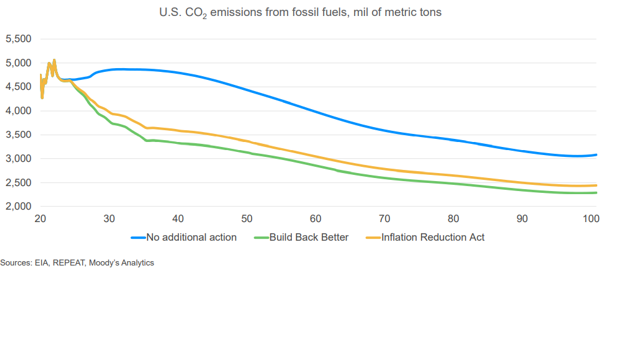At the end of July, President Biden announced that an agreement had been reached with West Virginia Senator Joe Manchin to endorse the Inflation Reduction Act.
The proposal is an evolution of Biden’s Build Back Better Act, which failed to pass through the US legislative system due to the initial absence of Manchin’s support. The new bill, which removes much of the potentially inflationary spending that Manchin initially took issue with, includes a $369bn provision to energy security and climate change1. This allocation represents one of the biggest single pieces of climate legislation ever enacted.
What are the key points of the Act?2
Climate measures –
$369bn over ten years committed to energy security and climate change3, including:
- Up to $7,500 in tax credits for purchasing electrical vehicles, for households with income less than $300,0004
- $14,000 in direct consumer rebates for families to buy heat pumps or other energy efficient home devices
- A 30% tax credit for 7.5 million families to install solar panels on their roofs, saving $9,000 over the life of a solar panel system
- Facilitating the production of 950 million solar panels, 120,000 wind turbines and 2,300 grid scale battery plants
As well as non-climate measures –
- Significant reform to the US corporate tax system that would enforce a 15% minimum rate on all US companies that have made an average profit of more than $1bn over the last three years, raising over $700bn5
- A significant allocation to reducing the cost of healthcare to Americans, including:
- Capping Medicare Part D (Medicare drug coverage) bills for 50 million Americans to $2,000 per year
- Increasing the number of Americans with health insurance by 3 million
What differentiates the Act from previous climate legislation is a focus on the lower and middle income consumer. Targeted tax credits for improving household energy efficiency, as well as encouraging families to buy electric cars, are a welcome development that gives people a tangible way to make a difference in their everyday lives.
The Act is also more of a carrot than a stick and is overwhelmingly geared towards incentivising consumers and business to invest in improving their energy efficiency, rather than overtly punishing emitters. However, the Act does include an increased cost for polluting methane, one of the most damaging greenhouse gases, over a shorter period of time.
What will the impact be on investors?
The passing of the Inflation Reduction Act is a major tailwind to several of Tribe’s core investment themes, such as the energy transition and green infrastructure. Companies operating across the energy sector, including wind and solar producers, heat pump manufacturers, as well as providers of alternative fuels, stand to directly benefit from the increased competitiveness of their products. We’ve already seen some positive price movements in some of our names. We also expect continued momentum over the next few years as orders begin to filter through to company earnings, and as management commit to expansion plans that had been put on hold as the original Build Back Better proposal was held up.
Within transport for example, the Act further increases the competitiveness of electric vehicles. Analysis by Bloomberg suggests that electric trucks operating in urban routes may receive a per mile cost advantage of as much as 20% by 2023 vs diesel competitors6.
The Inflation Reduction Act is not, however, an overnight cure for the upwards price pressures being felt in the US or elsewhere. The current causes of inflation have been predominantly driven by external factors, such as global supply chain difficulties and the war in Ukraine, but don’t preclude the contribution of the climate crisis to global food prices. We’re already witnessing increasing pressure on global harvests as a result of increasing extreme weather events, water stress and droughts. However, the long-term impact of the Act should lead to lower energy and medical bills for households.
Will the difference be material to fighting the climate crisisClimate crisisThe catastrophic and fast accelerating nature of global warming currently being experienced. read more?
The bill aims to reduce 2030 emissions to 40% below 2005 levels. Whilst on its own, the measures won’t be enough to steer the US to meet its 2050 net zero target, it’s a recommitment to a path that was significantly derailed during the previous administration. The Inflation Reduction Act is a step in the right direction, and Moody’s estimate that total emissions will be 30% lower in 2050 than if no legislative changes occurred at all7.

The Act does, however, include some measures that are not environmentally friendly. As part of the final negotiations to get the Act over the line, ground was given to allow some new oil and gas projects to be operated on federal land. This was seen as necessary to gain Senator Manchin’s support, who represents the coal reliant state of West Virginia. However, the net benefit is still overwhelmingly positive, with as much as 24 tons of carbon emissions cut for every 1 extra ton emitted8.
With the passing of the Inflation Reduction Act, the hope is that this proves that material climate legislation is possible in an increasingly divided US political system. Although the final bill didn’t gain any Republican support, there is a clear recognition of the “just transition” in the text. This means acknowledging and managing the many challenges of the energy transition, including finding new opportunities for people working in legacy energy industries.
Beyond climate
There are other compelling elements to the Act, most notably the reforms to the US tax system, particularly those that target the current loopholes that permit:
- Large corporations to use complex structures to pay minimal federal tax
- High income individuals at investment firms who pay reduced income tax by treating compensation as capital gains.
The healthcare element of the Act also targets lower income groups, as well as those with a critical need for prescription medicine such as insulin. Treatment costs in these areas will be capped, and Medicare will be given new authority to negotiate on behalf of patients, which should lead to lower prices given the organisation’s scale.
Final reflections
The passage of the Inflation Reduction Act is a promising development and reinforces Tribe’s belief in the investment opportunity presented by the UN Sustainable Development Goals (SDGs). Looking forward, the hope is that the influence of the bill will extend beyond the targeted measures included in the Act. This legislation has set out a clear vision that the US is back onside in combatting the climate crisis. It gives President Biden credibility when asking other nations to do the same. This is timely ahead of COPConference of the Parties (COP)The Convention of the Parties to the United Nations Framework Convention on Climate Change (UNFCCC). The COP is the highest decision-making body of the Convention. Every year the UNFCCC hosts the COP to drive action on climate change. read more 27 in Egypt in November 2022, where there is expected to be pressure on governments for climate progress and solutions. The Act is expected to deliver a net positive impact on US economic growth, a country which remains one the largest geographical allocations in Tribe portfolios.





